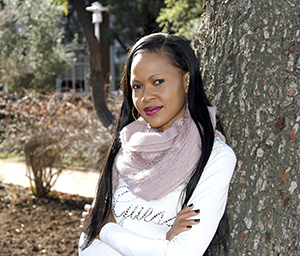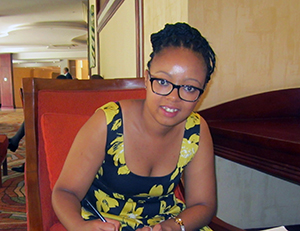Latest News Archive
Please select Category, Year, and then Month to display items
01 October 2019
|
Story Xolisa Mnukwa
|
Photo Xolisa Mnukwa
 From the left; Gift Taku, 2019 Doty winner; Reabetswe Mabine, Doty Coordinator Tshepo Zweni, first runner-up and Jacobeth Selinga, second runner-up
From the left; Gift Taku, 2019 Doty winner; Reabetswe Mabine, Doty Coordinator Tshepo Zweni, first runner-up and Jacobeth Selinga, second runner-up
The votes have been tallied, and after much deliberation, the UFS is proud to announce Gift Taku as the winner of the 2019 KovsieGear Designer of the Year (DOTY) Competition!
Tshepo Zwane and Jacobeth Selinga won second and third place respectively, with innovative designs that complied with the assessment requirements, based on originality of the design, adherence to the brand guidelines, creativity, and other criteria.
Gift’s design triumphed with 845 votes on the UFS KovsieLife webpage, as well as in the presentation in front of a judging panel.
Since 2016, KovsieGear has been discovering local (UFS staff and students) graphic designers and giving them a platform to showcase their work through DOTY, which runs annually. The aim of the competition is to support local talent by giving entrants an opportunity to come up with creative designs that are unique to the university and which will be used on limited-edition apparel in the store, as well as getting featured in the KovsieGear catalogue.
The competition has since fashioned the best clothing-logo designs the university has ever seen and continues to motivate and empower students to make positive contributions to the Kovsie campus culture and brand.
For more information about DOTY contact Reabetswe Mabine at MabineR@ufs.ac.za
The winning design by Gift Taku:

Trauma, Forgiveness, and Reconciliation Studies attracts global attention
2016-06-27

Lerato Machetela is on her way to
Ghent University in Belgium where
she will spend 10 months working
alongside experts in the field of
historical trauma.
Photo: Eugene Seegers
Research excellence is one of the major driving forces at the core of the University of the Free State (UFS). This striving for academic distinction has found embodiment within Trauma, Forgiveness, and Reconciliation (TFR) Studies. Headed by Research Fellow and Senior Research Professor Pumla Gobodo-Madikizela, the research unit is raking in achievements consistently.
Cornell University Distinguished African Scholar Award
Leading by example, Prof Gobodo-Madikizela received the prestigious 2016 Distinguished African Scholar Award from Cornell University recently. Being honoured with this award affirms an unusual depth of knowledge and experience in a field related to the recipient’s own work. Through this award, Prof Gobodo-Madikizela is now also affiliated with the Institute for African Development and the Psychology Department at Cornell University.
Ghent University fellowship in historical trauma
Another member of TFR has caught international attention. Lerato Machetela – a PhD student at the research unit – received an invitation from scholars at Ghent University in Belgium. Machetela will leave in September, where she will spend ten months in Ghent with experts in the field of historical trauma. She will be affiliated to their university’s Cultural Memory Studies Initiative and the Psychology Department. When Machetela submitted her PhD proposal on transgenerational transmisison of trauma among the youth in Jagersfontein to the UFS Psychology Department panel, “it was hailed as a unique project, and a first for the department,” Prof Gobodo-Madikizela says.

Naleli Morojele conducting the research
in Rwanda that has formed the basis of
her new book, Women Political Leaders
in Rwanda and South Africa: Narratives
of Triumph and Loss.
Book explores triumph and loss of female political leaders
TFR cultivates thriving authors actively, the latest being Naleli Morojele, who is pursuing a PhD in the field of Political Studies. Soon, Morojele will be launching her book, Women Political Leaders in Rwanda and South Africa: Narratives of Triumph and Loss. Through the stories of significant female Rwandan and South African leaders, the reader gains insight into these women’s early-life experiences, struggles, and successes. Perhaps even more pertinently, Morojele’s book also exposes the ways in which gender inequality still works to smother their roles as citizens and politicians.